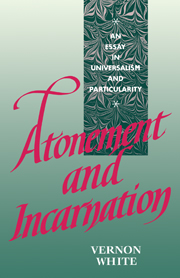Book contents
- Frontmatter
- Contents
- Introduction
- 1 The claim
- 2 On having lived too long and seen too much
- 3 The work of Christ (On trying to conceive how ‘things are not as they were’)
- 4 Two recent contributions
- 5 Creating an atonement model
- 6 The person of Christ (On trying to conceive how the Word became Flesh)
- 7 A moral demand: conditions for real reconciliation
- 8 Anthropocentricity, imperialism, and evangelism: an ethical postscript
- Notes
- Bibliography
- Index
8 - Anthropocentricity, imperialism, and evangelism: an ethical postscript
Published online by Cambridge University Press: 21 September 2009
- Frontmatter
- Contents
- Introduction
- 1 The claim
- 2 On having lived too long and seen too much
- 3 The work of Christ (On trying to conceive how ‘things are not as they were’)
- 4 Two recent contributions
- 5 Creating an atonement model
- 6 The person of Christ (On trying to conceive how the Word became Flesh)
- 7 A moral demand: conditions for real reconciliation
- 8 Anthropocentricity, imperialism, and evangelism: an ethical postscript
- Notes
- Bibliography
- Index
Summary
A moral impetus behind a theological position is all very well, and probably a necessary condition of commending any serious theology. But it is hardly a sufficient condition. On the contrary, just because of strong moral backing a theology is just as likely to arouse suspicion and wariness as well. Justifiably so: in so far as religion is bound to believe it is right (in the moral as well as factual sense), then it is always liable to be tyrannical in its expectations and ethics. This is a conspicuous and contemporary danger. It is, moreover, especially associated with theological positions such as that I have been outlining, where a universal concern is rooted in a particular event of revelation. And since I take it that ethical implications of theological positions do matter, it behoves us to look at them, however briefly. At the very least we must be sure that there is no necessary route from what seemed to be sound soteriology to what turns out to be bad ethics.
One possible area of criticism arises out of the observations with which we began, regarding the expanding size of our world: more particularly, our new understanding of the size of the universe. For it is not just that there are so many people. There is also so much time, space, organic, and material reality beyond and apart from humankind. That is the clear and largely undisputed claim of relatively recent geological, biological, and astronomical discoveries.
- Type
- Chapter
- Information
- Atonement and IncarnationAn Essay in Universalism and Particularity, pp. 107 - 116Publisher: Cambridge University PressPrint publication year: 1991



